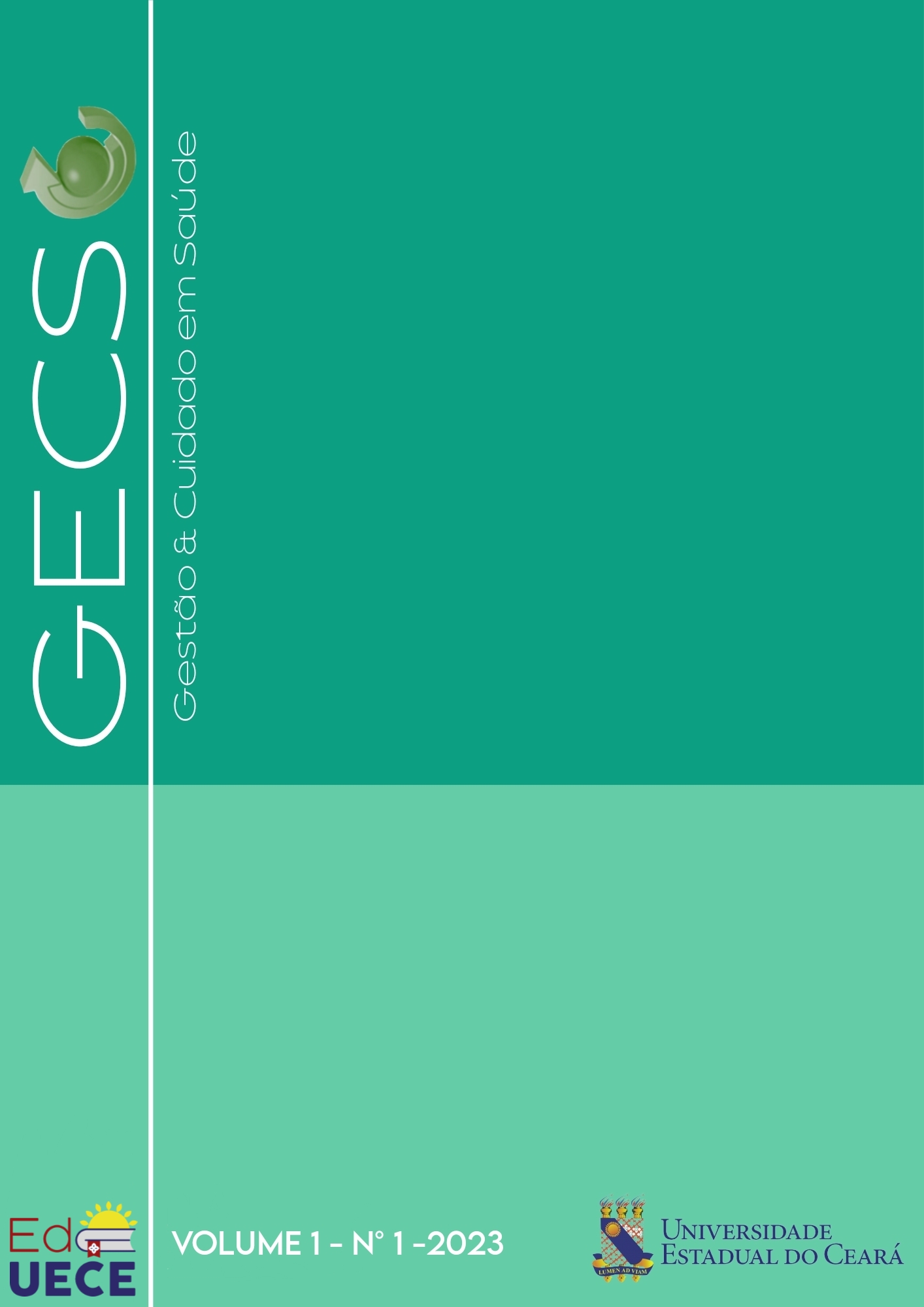Profile of suspected cases of COVID-19 in a Neonatal Intensive Care Unit: treatment and clinical outcome
DOI:
https://doi.org/10.70368/gecs.v1i1.11949Keywords:
COVID-19, Health Profile, Newborn Respiratory Distress Syndrome., Neonatal Intensive Care UnitAbstract
This work aims to analyze the hospitalization profile of newborns suspected of having COVID-19 admitted to the Neonatal Intensive Care Unit, considering the clinical profile, treatment, and outcome for the newborn's hospital discharge. This is a retrospective cross-sectional observational study. Data were used from medical records of newborns admitted to COVID-19 Neonatal Intensive Care Units of a reference hospital in the northern region of Brazil. The searches were carried out using ICD-10 with codes B34.2, P220, and P229, in addition to an active search in the histories of the hospitalization sectors in the period from March 2020 to October 2021. The statistical analysis of the categorical and inferential analysis were done. Statistical processing was carried out using IBM SPSS software, adopting an alpha significance level of 5%. 67 newborns included, 55.2% (N=37) were male, with a gestational age of 34.7±3.87, from the Metropolitan region of Belém (53.7%). Of these 6 cases (8.9%) were positive for COVID-19, the female gender was predominant (66.6%), gestational age was 37.6 ± 2.1, and the route of contamination was family coexistence (83.3 %). The most used therapeutic strategy was Invasive Mechanical Ventilation, with a correlation between support time and gestational age (p-value=0.008). The hospitalization profile during the studied period corresponded to negative cases of the disease, with children born in 2020, preterm newborns, coming from the metropolitan region of Belém, and with favorable discharge outcomes.
References
ALBERT EISTEIN, Sociedade Beneficente Israelita Brasileira. Manejo Coronavírus (COVID-19). São Paulo, 30 jun. 2023. Disponível em: https://medicalsuite.einstein.br/pratica-medica/Documentos%20Doencas%20Epidemicas/Manejo-de-casos-suspeitos-de-sindrome-respiratoria-pelo-COVID-19.pdf.
ALMEIDA, P. D. et al. Cuidados de enfermagem ao recém-nascido no contexto da pandemia da COVID-19: revisão integrativa. Research, Society and Development, v. 11, n. 17, p. e200111736373, 25 dez. 2022. Disponível em: https://www.researchgate.net/publication/366583506_Cuidados_de_enfermagem_ao_recem-nascido_no_contexto_da_pandemia_da_COVID-19_revisao_integrativa. DOI: https://doi.org/10.33448/rsd-v11i17.36373
ARAUJO, J. P. et al. Um olhar para o recém-nascido com covid-19: revisão integrativa. Online Brazilian Journal of Nursing, v. 20, 5 maio 2021. Disponível em: https://pesquisa.bvsalud.org/portal/resource/pt/biblio-1223174. DOI: https://doi.org/10.17665/1676-4285.20216454
BENTLIN, M. R. et al. Coronavírus e Recém-nascido: O que se sabe até o momento? Versão 3. São Paulo: 2020. Disponível em: https://www.spsp.org.br/PDF/SPSP-DC%20Neonatologia-Covid-vers%C3%A3o3-25.09.2020.pdf.
BEOZZO, G. P. N. S.et al. Neonatal manifestations in COVID-19 patients at a Brazilian tertiary center Clinics. Clinics, v. 75, p. e2407, 1 jan. 2020. Disponível em: https://www.ncbi.nlm.nih.gov/pmc/articles/PMC7654941/. DOI: https://doi.org/10.6061/clinics/2020/e2407
BLENCOWE, H. et al. Born too soon: the global action report on preterm birth. Reproductive Health, v. 10, p. 112, 2013. Disponível em: https://www.who.int/publications/i/item/9789241503433. DOI: https://doi.org/10.1186/1742-4755-10-S1-S2
CHEN, Z. et al. Diagnosis and treatment recommendations for pediatric respiratory infection caused by the 2019 novel coronavirus. World Journal of Pediatrics, v. 16, n. 3, p. 240–246, 1 jun. 2020. Disponível em: https://pubmed.ncbi.nlm.nih.gov/32026148/. DOI: https://doi.org/10.1007/s12519-020-00345-5
COLLETI JUNIOR, J. et al. High-flow nasal cannula as a post-extubation respiratory support strategy in preterm infants: a systematic review and meta-analysis. Jornal de Pediatria, v. 96, n. 4, p. 422–431, 1 jul. 2020. Disponível em: https://pubmed.ncbi.nlm.nih.gov/31951817/. DOI: https://doi.org/10.1016/j.jped.2019.11.004
CUI, X. et al. A systematic review and meta-analysis of children with coronavirus disease 2019 (COVID-19). Journal of Medical Virology, v. 93, n. 2, p. 1057–1069, 1 fev. 2021. Disponível em: https://pubmed.ncbi.nlm.nih.gov/32761898/. DOI: https://doi.org/10.1002/jmv.26398
DA SILVA, R. M.M. et al. Factors related to duration of hospitalization and death in premature newborns*. Revista da Escola de Enfermagem, v. 55, p. 1–8, 2021. Disponível em: https://www.scielo.br/j/reeusp/a/dvLJw65r6CLCHfX54S7NTcN/. DOI: https://doi.org/10.1590/s1980-220x2019034103704
DE FREITAS, B. H. B. M.; ALVES, M. D. S. M.; GAÍVA, M. A. M. Prevention and control measures for neonatal COVID-19 infection: a scoping review. Revista Brasileira de Enfermagem. Associação Brasileira de Enfermagem, v. 73, p.e20200467, 2020. Disponível em: https://pubmed.ncbi.nlm.nih.gov/32667573/. DOI: https://doi.org/10.1590/0034-7167-2020-0467
GIULIANI, F. et al. Effects of prenatal exposure to maternal COVID-19 and perinatal care on neonatal outcome: results from the INTERCOVID Multinational Cohort Study. American Journal of Obstetrics and Gynecology, v. 227, n. 3, p. 488.e1-488.e17, 1 set. 2022. Disponível em: https://pubmed.ncbi.nlm.nih.gov/35452653/. DOI: https://doi.org/10.1016/j.ajog.2022.04.019
GRUENDING, A. et al. Born too soon Decade of action on preterm birth. Geneva: World Health Organization, 2023. v. 1. Disponível em: https://www.who.int/publications/i/item/9789240073890.
HOSPITAIS UNIVERSITÁRIOS FEDERAIS. Protocolo de manejo do COVID-19 neonatal - HU/UFSC/EBSERH. Hospitais Universitários Federais. [s.l: s.n.]. Disponível em: https://www.gov.br/ebserh/pt-br/hospitais-universitarios/regiao-sul/hu-ufsc/saude/covid-19/protocolos-e-planos-de-contingencia.
KOSTENZER, J. et al. Neonatal care during the COVID-19 pandemic - a global survey of parents’ experiences regarding infant and family-centred developmental care. eClinicalMedicine, v. 39, 1 set. 2021. Disponível em: https://pubmed.ncbi.nlm.nih.gov/34401688/. DOI: https://doi.org/10.1016/j.eclinm.2021.101056
LIMA, S. S. et al. Aspectos clínicos de recém-nascidos admitidos em Unidade de Terapia Intensiva de hospital de referência da Região Norte do Brasil. ABCS Health Sciences, v. 40, n. 2, 4 ago. 2015. Disponível em: https://pesquisa.bvsalud.org/portal/resource/pt/lil-754816. DOI: https://doi.org/10.7322/abcshs.v40i2.732
MOTTA, A. S. V. et al. Type of delivery and perinatal outcomes in pregnant women diagnosed with COVID-19: A systematic review and meta-analysis. European Journal of Obstetrics and Gynecology and Reproductive Biology, v. 292, p. 112–119, 1 jan. 2024. Disponível em: https://www.sciencedirect.com/science/article/abs/pii/S0301211523008254. DOI: https://doi.org/10.1016/j.ejogrb.2023.11.019
ONCEL, M. Y. et al. A multicenter study on epidemiological and clinical characteristics of 125 newborns born to women infected with COVID-19 by Turkish Neonatal Society. European Journal of Pediatrics, v. 180, p. 733–742, 2021. Disponível em: https://pubmed.ncbi.nlm.nih.gov/32776309/. DOI: https://doi.org/10.1007/s00431-020-03767-5
PAVÃO, A. L. et al. Considerações Diagnostico Laboratorial Pandemia. Observatótio COVID-19 Informação para ação Fiocruz, p. 1–20, 2020. Disponível em: https://portal.fiocruz.br/documento/nota-tecnica-consideracoes-sobre-o-diagnostico-laboratorial-da-covid-19-no-brasil.
PONTUAL, M. P. et al. Premature birth and COVID-19: an integrative review/ Nascimento prematuro e COVID-19: uma revisão integrativa. Brazilian Journal of Health Review, v. 4, n. 4, p. 1490214911, 11 jul. 2021. Disponível em: https://ojs.brazilianjournals.com.br/ojs/index.php/BJHR/article/view/32754. DOI: https://doi.org/10.34119/bjhrv4n4-043
RAJAPAKSE, N.; DIXIT, D. Human and novel coronavirus infections in children: a review. Paediatrics and International Child Health, v. 41, n. 1, p. 36–55, 2021. Disponível em: https://pubmed.ncbi.nlm.nih.gov/32584199/. DOI: https://doi.org/10.1080/20469047.2020.1781356
SANTOS, A. O.; BARROS, F. P. C.; DELDUQUE, M. C. A pesquisa em saúde no Brasil: desafios a enfrentar. Saúde em Debate, v. 43, n. spe5, p. 126–136, 2019. Disponível em: https://www.scielo.br/j/sdeb/a/3LJkC87H3XNw99Zq7zcDVwH/. DOI: https://doi.org/10.1590/0103-11042019s511
SANTOS, C. A. D. et al. Maternal and Neonatal Outcomes Associated with Mild COVID-19 Infection in an Obstetric Cohort in Brazil. American Journal of Tropical Medicine and Hygiene, v. 107, n. 5, p. 1060–1065, 1 nov. 2022. Disponível em: https://pubmed.ncbi.nlm.nih.gov/36252801/. DOI: https://doi.org/10.4269/ajtmh.22-0421
SARMAN, A.; TUNCAY, S. Principles of approach to suspected or infected patients related Covid-19 in newborn intensive care unit and pediatric intensive care unit. Perspectives in Psychiatric Care. v. 57, n. 2, p. 957-964, 1 abr. 2021. Disponível em: https://pubmed.ncbi.nlm.nih.gov/33184910/. DOI: https://doi.org/10.1111/ppc.12643
SMITH, V. et al. Maternal and neonatal outcomes associated with COVID-19 infection: A systematic review. PLoS ONE, v. 15, n. 6, 1 jun. 2020. Disponível em: https://pubmed.ncbi.nlm.nih.gov/32497090/. DOI: https://doi.org/10.1371/journal.pone.0234187
VARDHELLI, V. et al. Perinatal COVID-19: review of current evidence and practical approach towards prevention and management. European Journal of Pediatrics, v. 180, p. 1009–1031, 2021. Disponível em: https://pubmed.ncbi.nlm.nih.gov/33184730/. DOI: https://doi.org/10.1007/s00431-020-03866-3
WALD, E. R.; SCHMIT, K. M.; GUSLAND, D. Y. A Pediatric Infectious Disease Perspective on COVID-19. Clinical infectious diseases: an official publication of the Infectious Diseases Society of America, v. 72, n. 9, p. 1660–1666, 2021. Disponível em: https://pubmed.ncbi.nlm.nih.gov/32766824/. DOI: https://doi.org/10.1093/cid/ciaa1095
YUE, G. et al. Risk factors of mechanical ventilation in premature infants during hospitalization. Therapeutics and Clinical Risk Management, v. 17, p. 777–787, 2021. Disponível em: https://www.ncbi.nlm.nih.gov/pmc/articles/PMC8331080/. DOI: https://doi.org/10.2147/TCRM.S318272
Downloads
Published
How to Cite
Issue
Section
Categories
License
Copyright (c) 2024 Polyana Maria do Espírito Santo Martins , Lorenna Costa Malaquias, André Gustavo Moura Guimarães

This work is licensed under a Creative Commons Attribution 4.0 International License.













